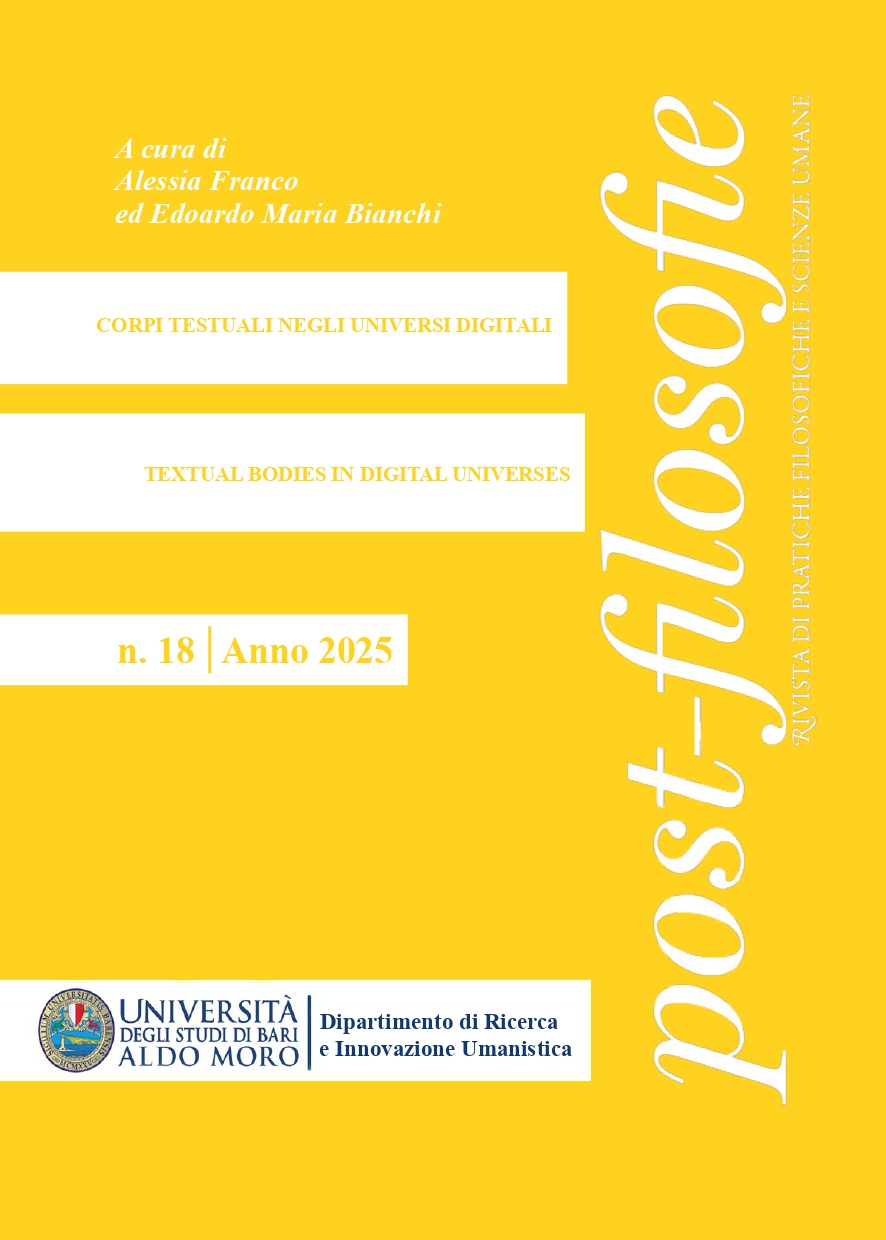«Post-filosofie» è una rivista scientifica collocata dall'Anvur (Agenzia nazionale di valutazione della ricerca universitaria) in fascia A dal 2021 per i seguenti settori scientifico-disciplinari: 11/C1 (Filosofia teoretica), 11/C3 (Filosofia morale), 11/C5 (Storia della Filosofia).
«Post-filosofie», che dal numero sette diventa una rivista digitale, vuole continuare a essere un luogo aperto di interrogazione, di confronto e di critica delle scienze del nostro tempo, soprattutto di quelle scienze nei cui paradigmi epistemologici e nelle cui tradizioni di ricerca si è sedimentato il sapere dell’umano con le sue forme peculiari di razionalità. La scelta del digitale è dovuta non solo, come è facile intuire, a ragioni finanziarie (data la scarsità di risorse che affligge le Università italiane e gli investimenti soprattutto nel sapere umanistico), ma anche ad un’esigenza di maggiore comunicatività, pur senza minimamente rinunciare al rigore metodologico e all’etica dell’indagine scientifica. Pertanto, il progetto originario che animava «Post-filosofie» nella sua versione a stampa, che ha dato vita a numeri monografici eterogenei nei punti di vista e densi nella dimensione teorica (e che potrete trovare a disposizione nell’archivio online), resta immutato e tuttora valido.
Riteniamo, infatti, che oggi la pratica della filosofia non possa ridursi a una “ruminazione” storiografica fine a se stessa, ma debba incontrare sul suo stesso terreno gli archivi e le sfide del tempo. Sotto questo profilo, il prefisso “post-”, per quanto inflazionato, allude da un lato al pluralismo degli orientamenti e delle prospettive filosofiche come un dato di fatto incontestabile della nostra attualità, dall’altro a un movimento di torsione interna alla tradizione filosofica nella ricerca di nuovi linguaggi e di nuove categorie in grado di pensare e comprendere il nostro presente. Su questo punto siamo d’accordo con Deleuze e Guattari quando affermano che “non si può ridurre la filosofia alla propria storia, perché la filosofia non smette di divincolarsene per creare nuovi concetti che pur ricadendovi non ne derivano” (G. Deleuze – F. Guattari,Che cos’è la filosofia?).
Si tratta di intraprendere un lavoro di delimitazione critica della storia della filosofia (e, dunque, della metafisica) che non sia fine a stesso, vale a dire tale che non sfoci né in una ripetizione tautologica del Medesimo (come avviene in Heidegger), né in una mera ricostruzione delle branche speciali in cui la pratica filosofica si è via via strutturata (ontologia, gnoseologia, etica e così via) diventando così una disciplina accademica. Il lavoro di delimitazione critica consiste nell’accettare le sfide del pensiero e del mondo in cui viviamo sul terreno della sperimentazione filosofica facendo emergere volta per volta la fecondità e i limiti dei concetti che la pratica filosofica ci ha trasmesso.
Così intesa, la pratica filosofica conserva la sua connotazione intrinseca di sapere storico (per riprendere un’espressione cara a Eugenio Garin), ma in un’accezione pregnante rispetto al rischio sempre incombente di una sua museificazione o riduzione a mero reperto erudito. In questo orizzonte, il filosofo si troverà ad affrontare, a nostro avviso, almeno quattro compiti:
- riattraversare con un approccio critico-genealogico, e a partire dalle aporie del presente, il processo storico che dalla nascita della filosofia in Grecia ha condotto alla proliferazione delle conoscenze specialistiche proprie delle scienze naturali e delle scienze umane o sociali: dal politico al religioso, dal sociale al giuridico, dall’economico allo psicologico;
- esplorare il retroterra filosofico (metafisico, scientifico, teologico-politico), da cui è sorta e si è sviluppata la concettualità diffusa della nostra epoca, a cominciare da parole-chiave come “democrazia”, “cittadinanza”, “diritti umani”, “multiculturalismo”, ecc.;
- raccogliere ed elaborare sul piano della teoria le istanze di verità e di giustizia che provengono da un mondo “uscito fuori dai gangli”, mantenendo accesa la debole luce della ragione e dell’utopia;
- indagare le sfide del tempo presente e della complessità sociale, affinando gli strumenti della critica allahubriseconomicistica del turbo-capitalismo di questo inizio del XXI secolo e, al contempo, provando a dare voce e problematizzare le domande di riconoscimento delle molteplici “differenze” a partire da quelle sessuali e di genere, passando per quelle etniche e religiose, che vanno ridefinendo in forme inedite le soggettività contemporanee.
F.F.
F.R.R.L.







